Statement of the question
What are the health effects of climate change and what can be done to address them?
- Climate change, which is a universal problem, is thought to have devastating effects on human and animal health. However, the precise health effects are not known.
- We need to know the precise effects of climate change on health to devise appropriate strategies to counter them.
- This presentation explores different studies that have been done to ascertain the correlation between climate change and health.
- Recommendations to address the climate change issues will also be provided based on the findings of the studies and current measures to address climate change.
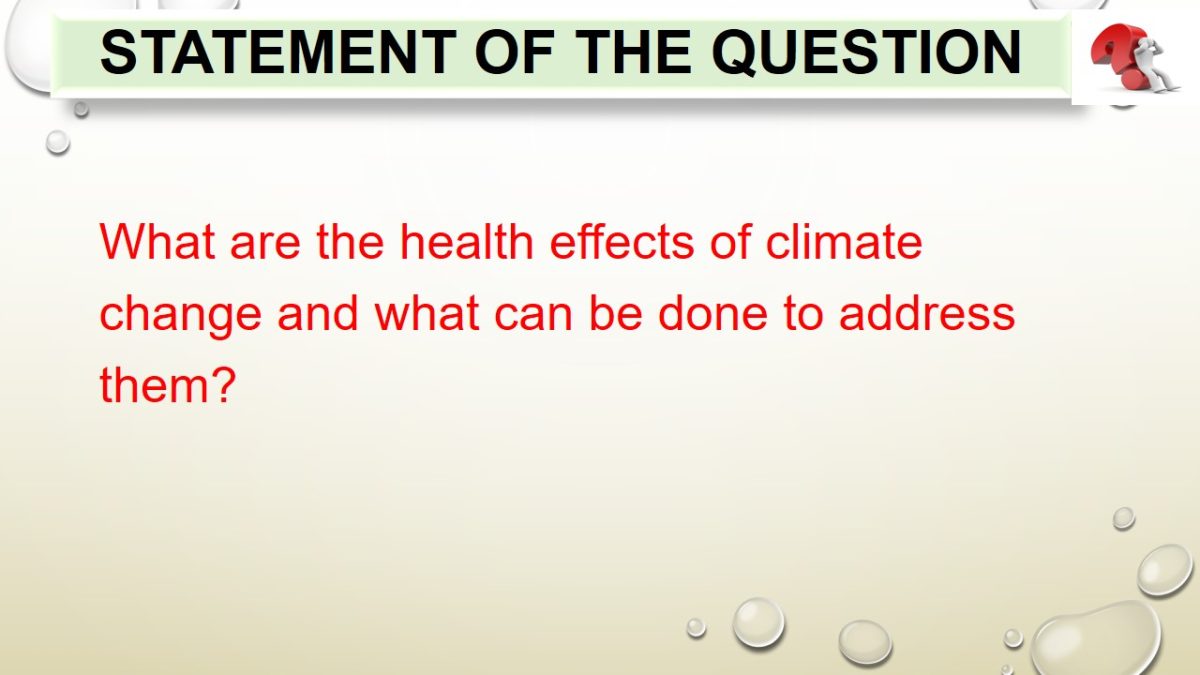
Background of the question
- Climate change affects the social and environmental aspects of health such as access to clean water, air, food and shelter.
- The mortality rates due to health problems have increased recently and are likely to increase further.
- The Who (par. 2) projects that climate change will increase global deaths to 250,000 annually in the next two decades.
- Climate change has environmental consequences that affect the physical, social and psychological health of humans.
- Therefore, the impacts of climate change on human health cannot be underestimated.
- Climate change causes changes in precipitation patterns that result in flooding and droughts, degraded air quality, extreme heat waves, intense hurricanes and tornadoes, rising in sea-levels, and unpredicted wind patterns.
- All these factors have direct and indirect effects on physical, social, and psychological health of humans.
- Extreme climatic changes increase disease predisposition especially among children, the elderly and those with compromised immune systems.
- Despite the negative effects of climate change, mitigation and adaptation strategies can be explored to prevent illness and deaths while protecting environment.
- Adoption of such strategies will address climate change and improve the environment and ultimately global health.
- A study done in 2008 showed that the death toll in Europe rose to 70,000 from 2003 because of the effects of climate change (natural calamities).
- In August 2003, 15,000 deaths occurred in France alone following an intense heat waves.
Climate change causes changes in precipitation patterns that result in flooding and droughts, degraded air quality, extreme heat waves, intense hurricanes and tornadoes, rising in sea-levels, and unpredicted wind patterns.
All these factors have direct and indirect effects on physical, social, and psychological health of humans.
Extreme climatic changes increase disease predisposition especially among children, the elderly and those with compromised immune systems.
Despite the negative effects of climate change, mitigation and adaptation strategies can be explored to prevent illness and deaths while protecting environment.
Adoption of such strategies will address climate change and improve the environment and ultimately global health.
A study done in 2008 showed that the death toll in Europe rose to 70,000 from 2003 because of the effects of climate change (natural calamities).
In August 2003, 15,000 deaths occurred in France alone following an intense heat waves.
Stowell et al. (42) predicted that by the 2050s, increased ozone levels due to combined climate change and emission control policies could increase premature deaths by 50 people annually in the US.
In the study, it was evident that industrialization played an important role in the influences of climate change on human health.
Wilke et al. (343) reported that the genera Aedes and Culex, which include vectors of mosquito-borne diseases, are highly invasive and adapted to man-made environments.
The man made environments refer to the changes brought about by revolutions in industrialization and agriculture hence climate change.
The climatic variations promote the breeding of mosquitoes with direct consequences to their disease transmission dynamics.
The three most important genera of mosquitoes are Anopheles (malaria parasite vector); Culex (vector for filariasis and several arboviruses, such as West Nile virus), and Aedes (which transmits dengue, Zika, chikungunya and yellow fever viruses).
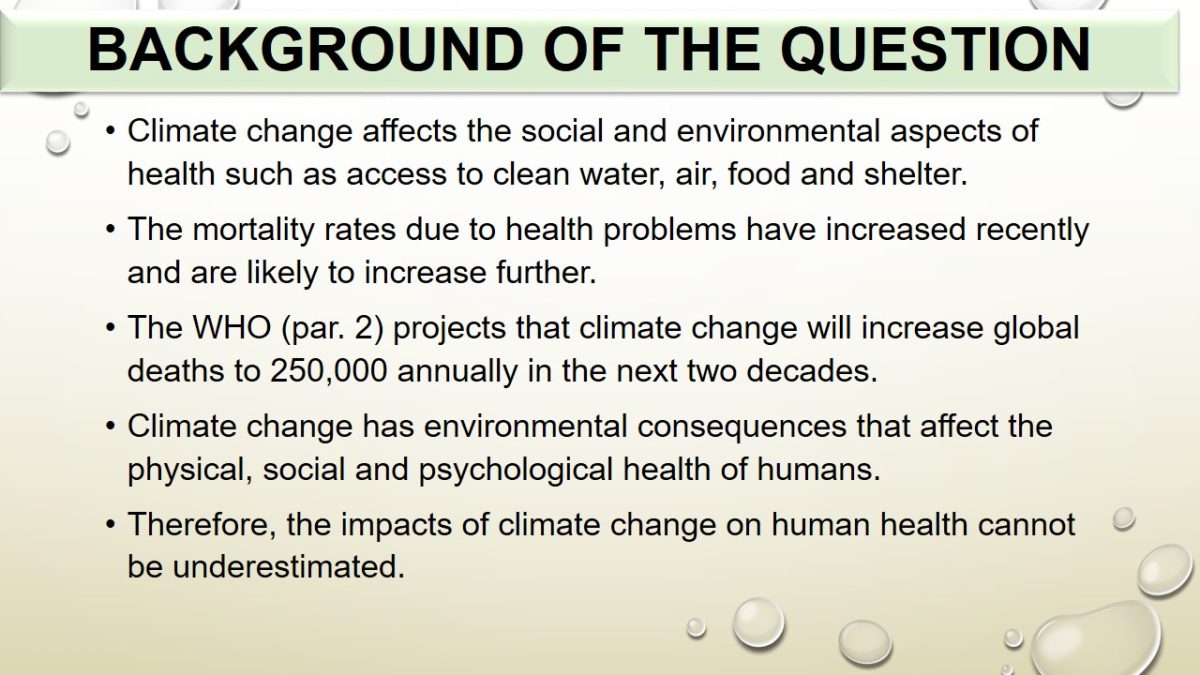
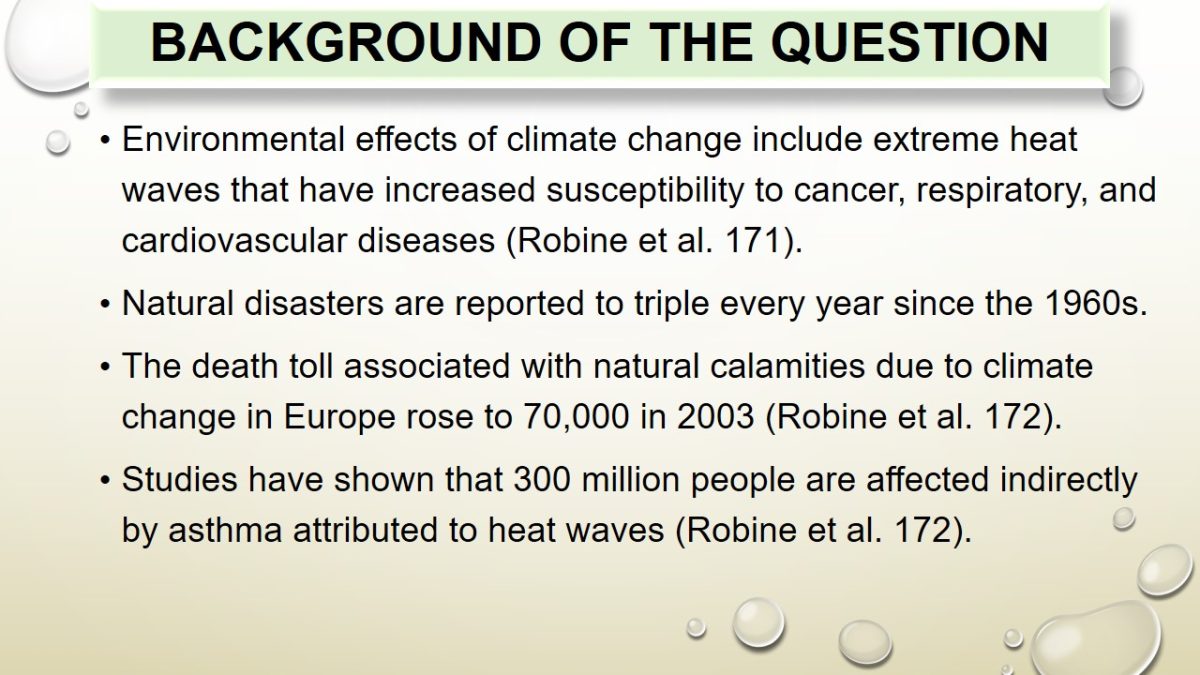
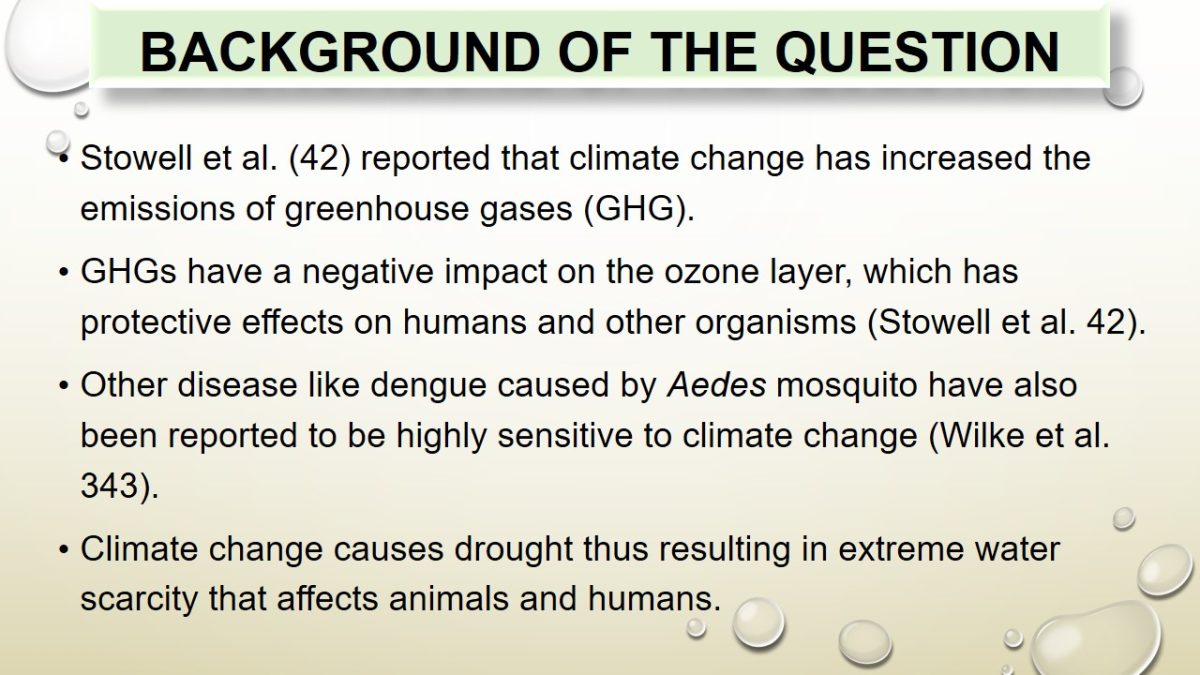
The Burden of Climate Change on Health Is Huge
This slide is a pictorial representation of how climate change affects human health and the economy.
Climate change increases flooding, heat waves, death toll due to air pollution, expenditure on remediating the effects of climate change, droughts, and increased cases of vector-borne diseases.
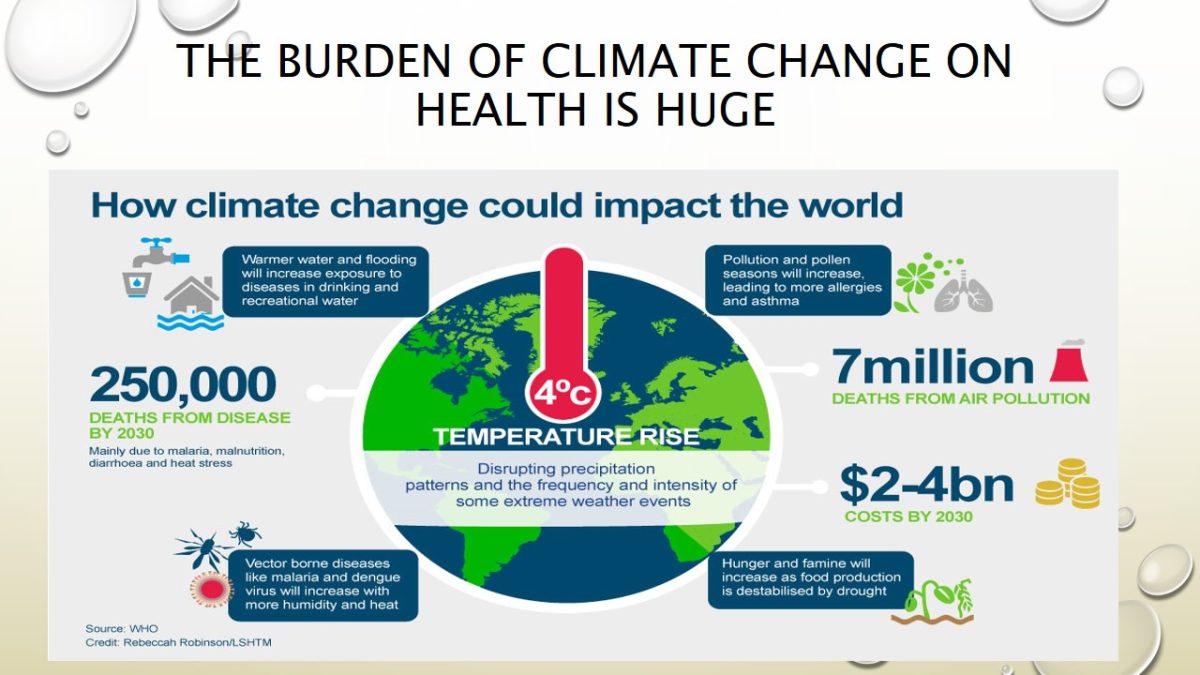
Literature review
Ma et al. (103)
- The study explains the impact of heat waves on human health in Shanghai, China.
- The study showed that heat waves increase annually in frequency and intensity.
- Temperatures were taken daily and compiled over a period of time.
- It was noted that mortality rates heightened with increased temperatures.
- The authors concluded that heat waves in urban areas is directly proportional to the adverse health effects observed.
The authors investigate the short-term effects of heat waves on mortality and its modifiers in China (Ma et al. 103).
Mortality rates were recorded over a 5-year period using Distributed Lag Non-linear Model (DLNM).
Separate DLNM models were fitted to investigate the effect of modification by individual characteristics (age, gender, cause of death, education level or place of death).
A meta-regression analysis was used to examine the potential effect of modification by community characteristic.
A total of 5.0% (95% confidence intervals (CI): 2.9%–7.2%) excess deaths were associated with heat waves in 66 Chinese communities, with the highest death rate being recorded in North China (6.0%, 95% CI: 1%–11.3%), followed by East China (5.2%, 95% CI: 0.4%–10.2%) and South China (4.5%, 95% CI: 1.4%–7.6%).
The authors concluded that the effects of heat waves were pronounced in urban areas and densely populated settlements.
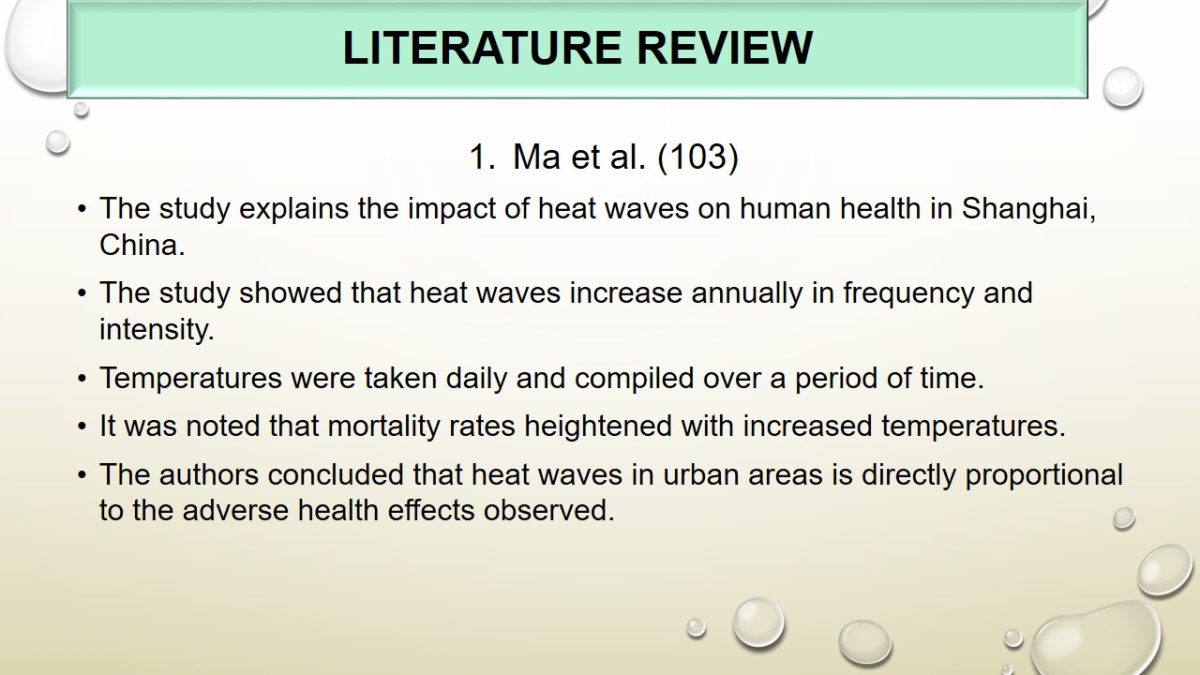
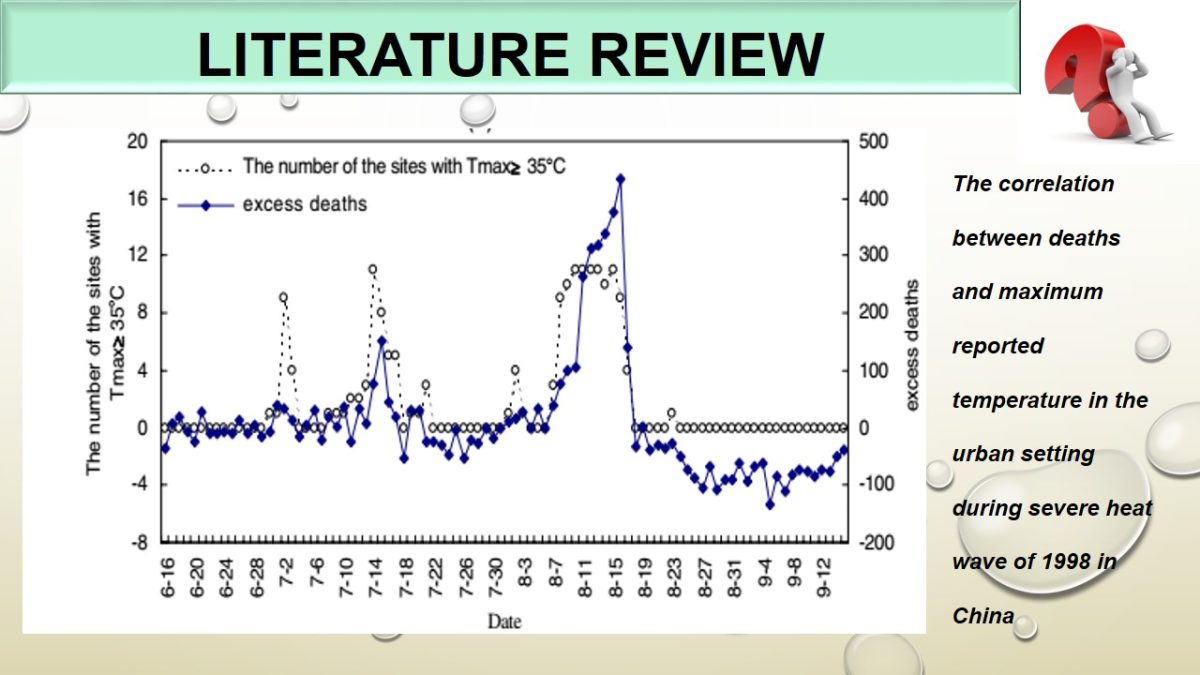
McMichael (1340)
- The review focused on globalization, climate change, and human health.
- There is a link between climate change and environment, economy, and social aspects.
- Mitigation strategies have been proposed in the review.
- Early indicators of climate change such as El Nino and increased vector-borne diseases are addressed.
- The study focused on assessing the exponential increases in demographic, economic, commercial, and environmental indexes (also called the Great Acceleration) that have resulted in environmental effects hence altering major components of the earth’s system.
- The loss of biodiversity has amplified global circulation of bioactive nitrogen compounds and that human induced climate changes have already reached levels that are unsafe.
- These effects could have unpredictable consequences on human health.
For example, shifts in climatic changes in Kenya since 1975 have been related to stunting in children.
The study focused on assessing the exponential increases in demographic, economic, commercial, and environmental indexes (also called the Great Acceleration) that have resulted in environmental effects hence altering major components of the earth’s system.
The loss of biodiversity has amplified global circulation of bioactive nitrogen compounds and that human induced climate changes have already reached levels that are unsafe.
These effects could have unpredictable consequences on human health.
For example, shifts in climatic changes in Kenya since 1975 have been related to stunting in children.
Factors that affect population health are grouped into three major domains — social, economic, and environmental — within which globalizing processes and changes occur.
The study concluded that the current environmental changes have adverse and far-reaching implications on human health.
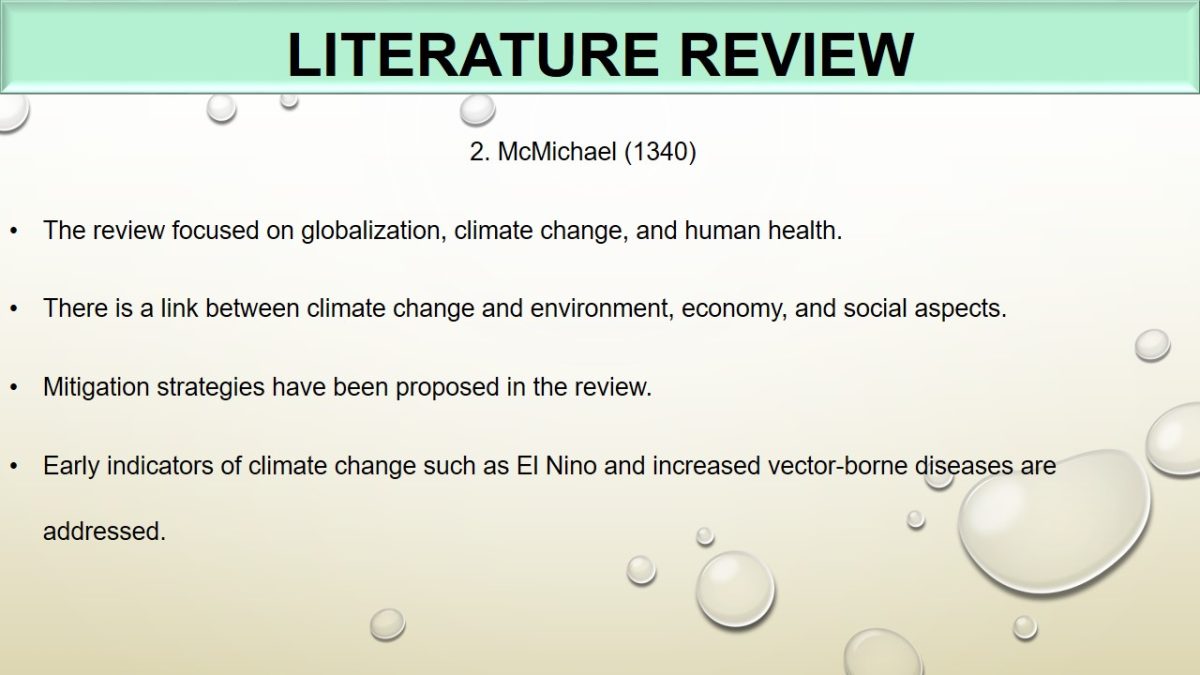
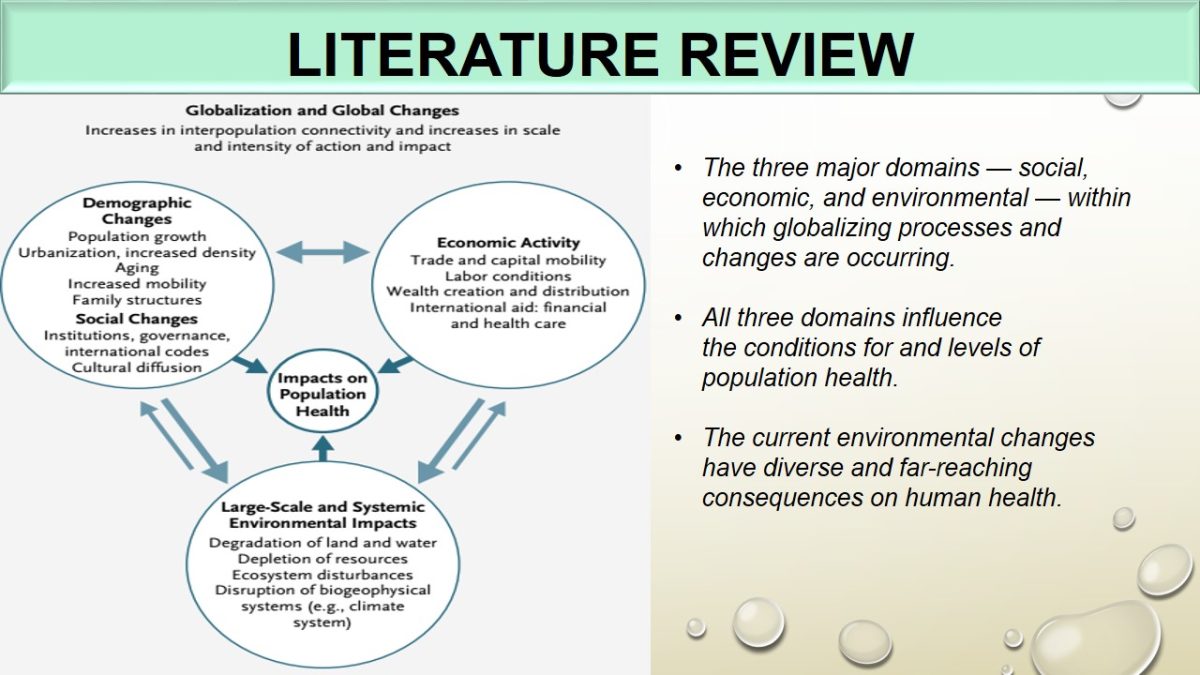
Hosking and Campbell-Lendrum (1076)
The authors identified five priority areas all revolving on climate change and human health.
The study assesses the impacts of mitigation and adaptation policies in curbing the climate change.
The study reviewed publications from 2008 onwards on the issue of climate change and health.
The authors noted that an increasing number of researchers are publishing new evidence on the issue every year.
Logic model for research on climate change and health in relation to global research priorities.
Categories reflect the priorities set by the WHO.
- The authors reviewed the influence of climate change and human health on policymakers.
- They noted that in 2008, WHO Member States passed a World Health Assembly (WHA) resolution recognizing the importance of climate change for human health and called for commitment to address climate change–related health threats.
- The member states recommended the following priorities:
- Health protection strategies and measures relating to climate change and their effectiveness.
- Mitigation measures in other sectors such as marine life, water resources, land use, and transport.
- Decision support and other tools such as surveillance and monitoring for assessing vulnerability and health impacts.
- Assessment of resources necessary for health protection from climate change.
- The authors found out that research on climate change and health is growing rapidly due to high publications concerning this topic.
- They also noted that a large proportion of publications on this topic consisted of reviews and editorials, which may be partly because climate change and health is a relatively new and emerging research field.
- Also, other differences between fields may influence the proportion of reviews and editorials.
- Such papers can help raise awareness regarding the links between climate change and health, and identify promising strategies for future evaluation.
- The authors recommended that more studies involving systematic reviews and quantitative approaches were needed.
- They also recommended that funding should be shifted towards attaining sustainable strategies for dealing with the impacts of climate change on human health.
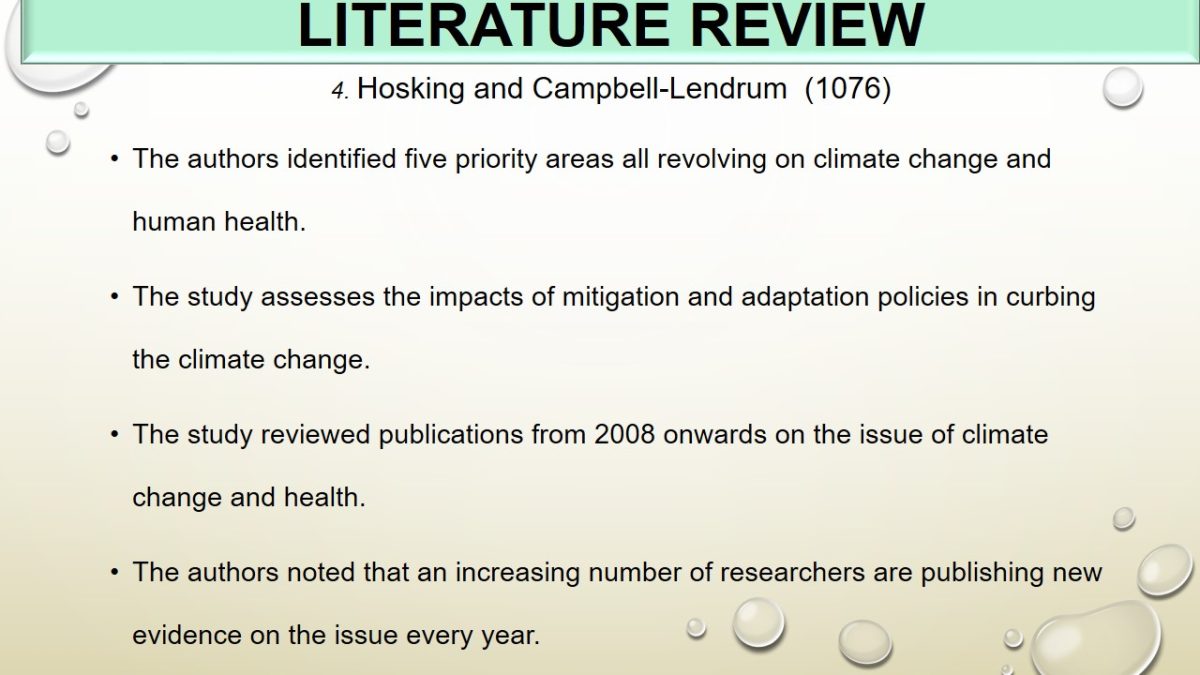
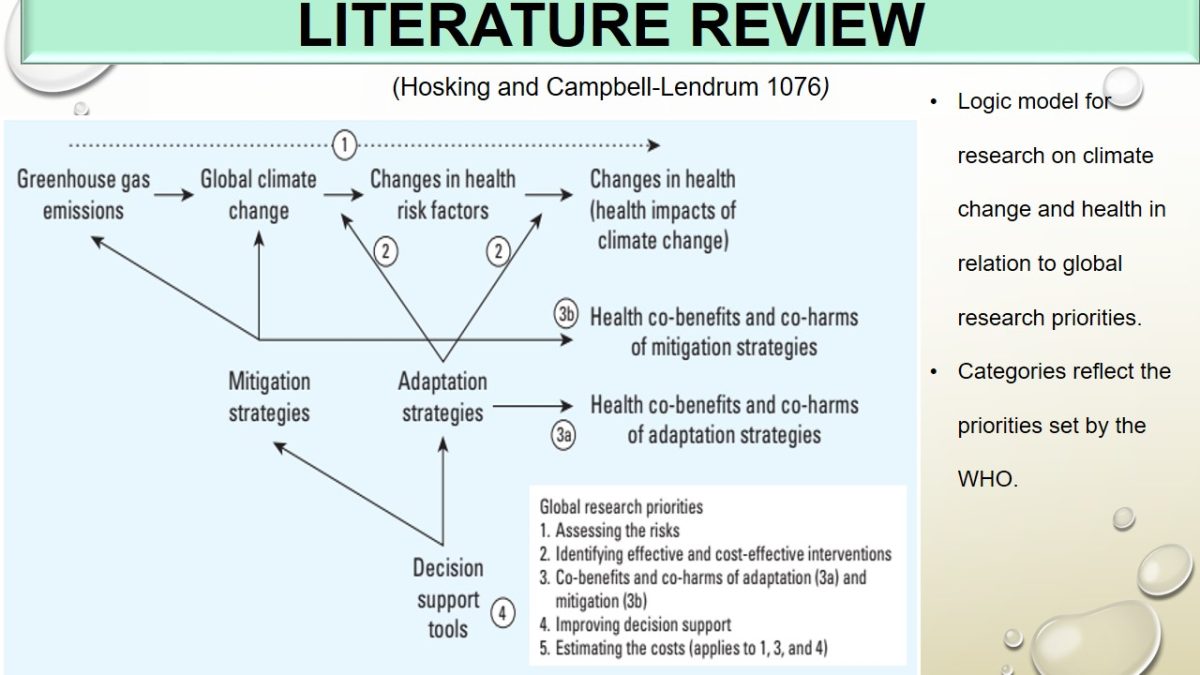
Faustini et al. (325)
- The study focused on the wildfires and particulate matter in Southern Europe.
- Climate change results in unexpected wildfires leading to smoky air.
- Respiratory tract infections have increased because of this reason.
- The authors found out that smoky days were associated with higher mortality rates.
- Smoky days also have a larger effect on cardiovascular and respiratory illness than on other days.
- They concluded that smoke is associated with increased cardiovascular mortality in urban residents.
- Direct acyclic graph exploring the effects of forest fires on
Death. - The contribution of forest fires on Particulate Matter (PM) concentrations could not be assessed.
- The impact of forest fires on temperature could not be assessed.
The paper focused on the effects of particulate matter from forest fires in Southern Europe.
Most forest fires in the Mediterranean area occur during spring–summer and overlap with Saharan outbreaks.
The fires are associated with increased temperatures.
The corresponding health effects such increased incidences of pulmonary and cardiovascular diseases are due to an increase in particulate matter.
They analyzed the effects of wildfires and particulate matter (PM10) on mortality rates in 10 southern European cities in Spain, France, Italy and Greece between 2003 and 2010.
They found out that smoky days were associated with increased cardiovascular mortality (lag 0–5, 6.29%, 95% CIs 1.00 to 11.85).
There was an increase in natural mortality (0.49%), cardiovascular mortality (0.65%), and respiratory mortality (2.13%) on smoke-free days.
PM10-related mortality was higher on smoky days (natural mortality up to 1.10% and respiratory mortality up to 3.90%).
The authors realized that smoke is associated with high levels of particulate matter.
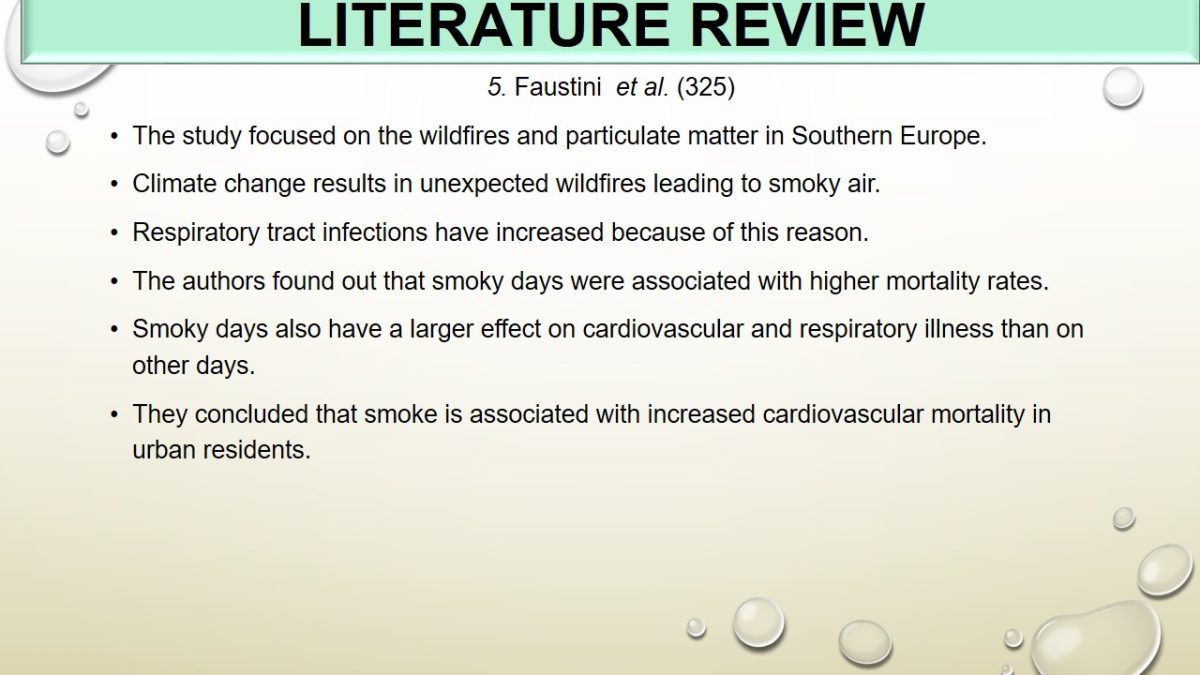
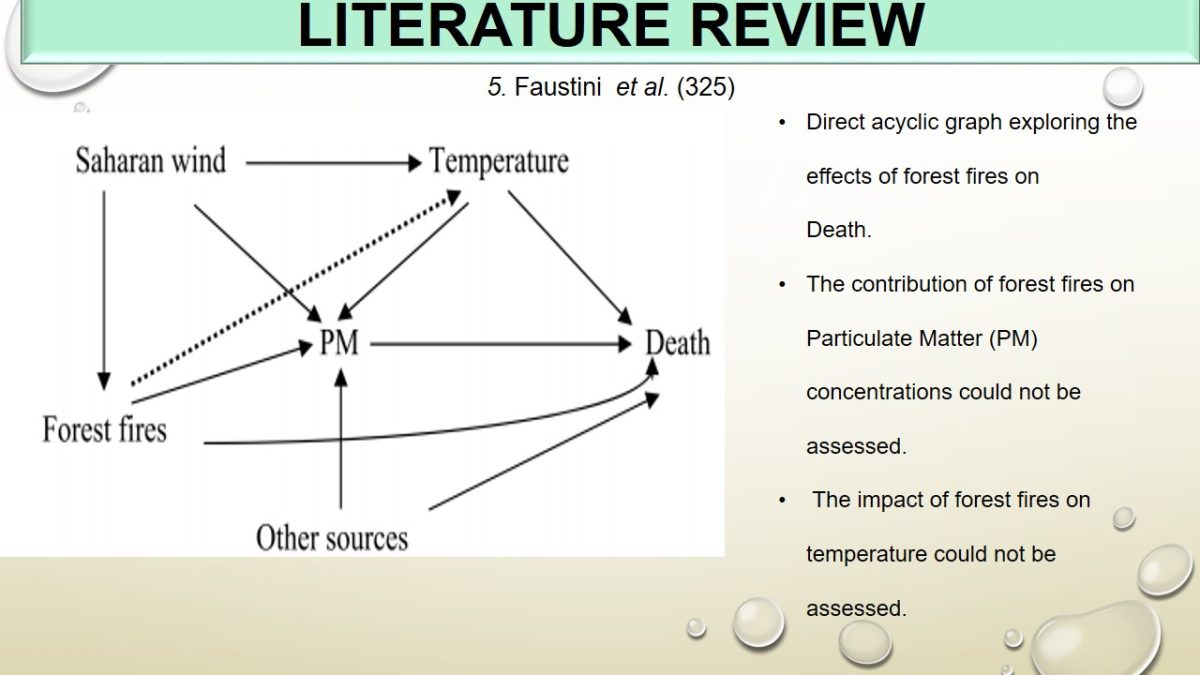
Personal Opinion
- Climate change has brought devastating effects on human health.
- The work that has been done on climate change revolves around global warming and gaseous pollutants.
- Industrialization has heightened the health hazards through unregulated affluent discharge.
- Heat waves and other natural calamities such as tornadoes and tsunamis have been exacerbated by climate change.
- Human beings play an important role in most aspects of climate change.
- Mitigating the harmful effects of climate change requires a collective responsibility.
- Proper handling of waste substances by individuals and industries is likely to minimize the release of noxious substances that worsen climate change and its related outcomes.
- In the meantime, manmade efforts can be used to prevent certain adverse effects of climate change, for example, using electric fans to provide cooling effects during heat waves.
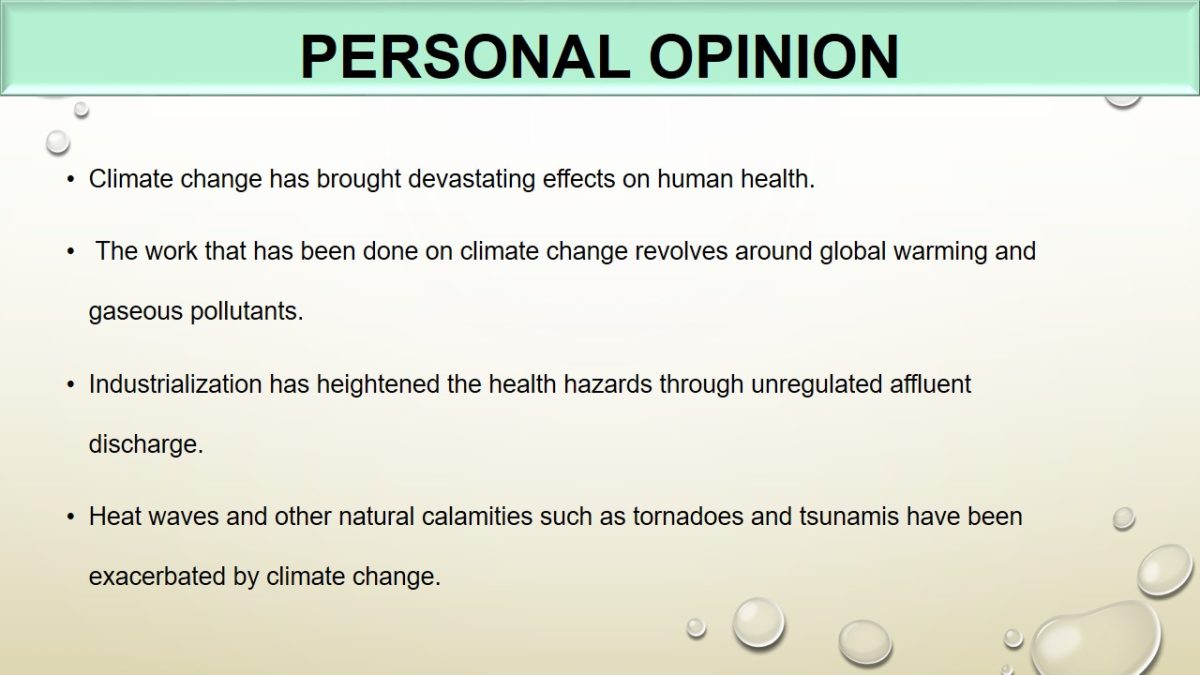
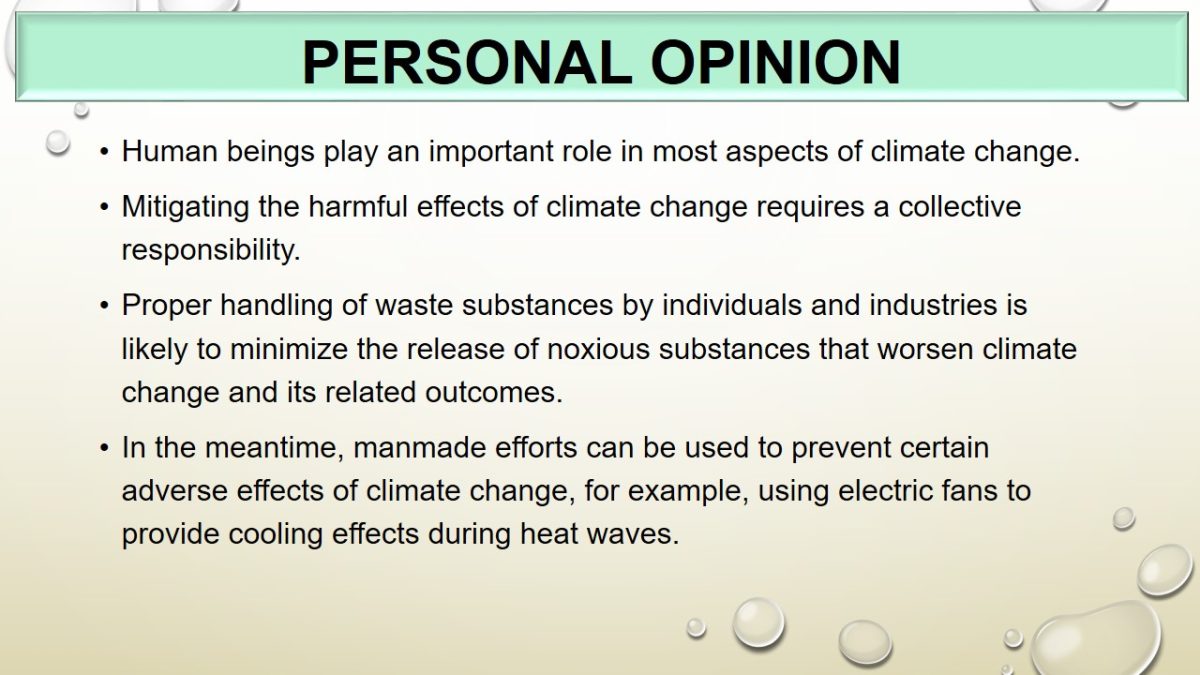
Summary and recommendations
- Current efforts to address the effects of climate change in health include:
- Strict legislations by Agencies such as United Nations Environmental Program have tried to enforce laws that ensure that environment is well protected.
- Hazardous materials that could compromise the environment have been banned e.g., leaded fuel.
- The use of environmental pollutants such as plastic carrier bags has been banned to reduce pollution.
- Partnerships between UN agencies are in place to represent health is the climate change agenda (WHO).
- Current efforts to address the effects of climate change in health include:
- Strict legislations by Agencies such as United Nations Environmental Program have tried to enforce laws that ensure that environment is well protected.
- Hazardous materials that could compromise the environment have been banned e.g., leaded fuel.
- The use of environmental pollutants such as plastic carrier bags has been banned to reduce pollution.
- Partnerships between UN agencies are in place to represent health is the climate change agenda (WHO).
Climate change involves complex interactions between climatic, environmental, economic, political, institutional, social, and technological processes.
Therefore, it cannot be addressed independent of broader societal goals (such as sustainable development), or other existing or probable future sources of stress.
Awareness campaigns should provide and disseminate information regarding the threats posed by climate change presents to human health.
Science and evidence should be exploited to address climate change by creating a global research agenda.
A public health response to climate change should help other nations build capacity to promote health and safeguard the environment.
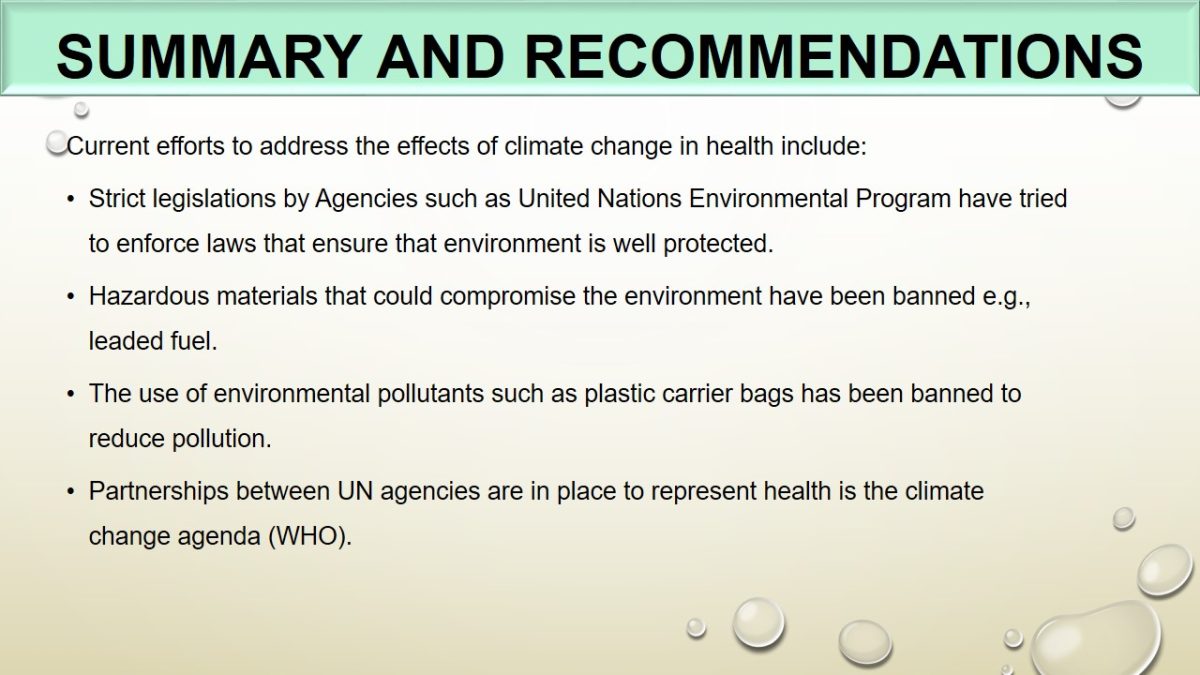
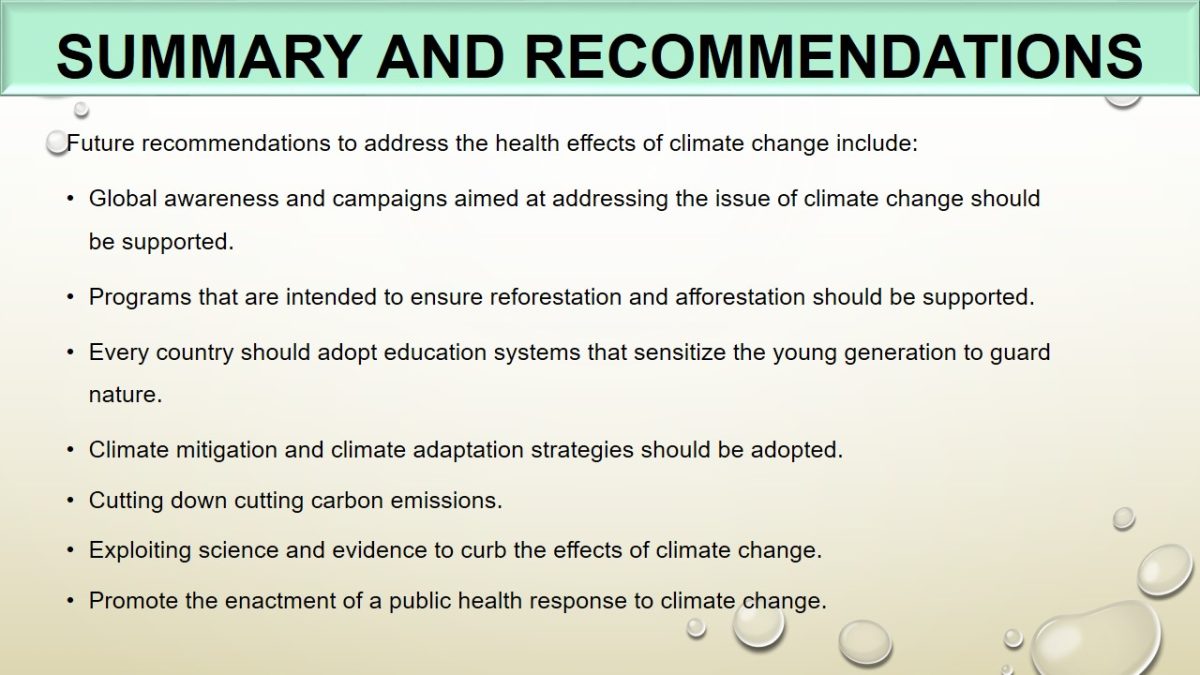
Works Cited
Faustini, Annunziata, et al. “Short-term Effects of Particulate Matter on Mortality During Forest Fires in Southern Europe: Results of the MED-PARTICLES Project.” Occupational and Environmental Medicine, vol. 72, no. 5, 2015, pp. 323-329.
Hosking, Jamie, and Diarmid Campbell-Lendrum. “How Well Does Climate Change and Human Health Research Match the Demands of Policymakers? A Scoping Review.” Environmental Health Perspectives, vol. 120, no. 8, 2012, p. 1076.
Liang, Song et al. “Surveillance Systems for Neglected Tropical Diseases: Global Lessons from China’s Evolving Schistosomiasis Reporting Systems, 1949–2014.” Emerging themes in epidemiology, vol. 11, no. 1, 2014, p. 19.
Ma, Wenjun, et al. “The Short-Term Effect of Heat Waves On Mortality and Its Modifiers in China: An Analysis From 66 Communities.” Environment International, vol. 75, 2015, pp. 103-109.
McMichael, Anthony J. “Globalization, Climate Change, and Human Health.” New England Journal of Medicine, vol. 368, no. 14, 2013, pp. 1335-1343.